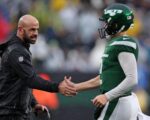Major League Soccer has significantly changed its hiring policies regarding front office and coaching roles by removing its requirements for minority interviews along with many related enforcement mechanisms, according to various sources informing ESPN.
The league’s previous hiring framework, known as the «MLS diversity hiring policy,» is now termed the «MLS advance policy.»
The updated policy is less centralized — allowing teams the freedom to develop their own hiring practices with minimal league oversight.
MLS’s interpretation of the Rooney Rule, named after the NFL’s minority hiring initiative, was initially put into practice in 2007, receiving a well-publicized update in 2021.
The aim was to provide greater opportunities for minority candidates to interview for technical positions within the league’s franchises, such as GMs, assistant GMs, managers, and assistant coaches, with the hope that this exposure would result in more minority hires.
The 2021 revision sought to enhance the effectiveness of the policy, focusing on the inclusion of Black candidates while aiming to bolster the policy’s enforcement mechanisms. It explicitly required that the candidate pool for an open technical position — defined as a coaching or front office role — feature at least two non-white candidates, with one being Black/African American. Failure to abide by the policy could result in fines for teams.
These mandates have now been revoked. As per MLS, the current framework allows teams to establish their own guidelines regarding their hiring processes for technical and front office roles.
Teams are also required to create a committee to oversee the interview process and appoint a senior leader responsible for overseeing the club’s hiring policy. Clubs have submitted an affidavit, similar to compliance with league roster regulations, confirming they will undertake these actions. MLS asserts that the objective is to assist minority candidates early in the interview process rather than simply fulfilling a requirement at the conclusion.
This new approach appears to reduce transparency regarding how clubs select their personnel. Not only do the teams’ frameworks no longer need to be approved by the league, but clubs are also freed from reporting the names of individuals who were considered finalists for positions.
When inquired about how he could ensure that minority candidates would be given interview opportunities, MLS EVP chief engagement officer Sola Winley cited the competitive landscape of clubs, noting that they would be motivated to seek out the best candidates, including minorities.
«If clubs are set on creating a process with a limited pool of candidates, I doubt it will give them the best edge in competition,» he remarked.
«Some clubs may take that route, but they are competing for the top talent, so their process must be one that allows them to cast the widest net possible [for technical roles].»
Regarding enforcement, Winley pointed to MLS commissioner Don Garber as the one with the authority to impose sanctions on teams not complying with the updated policy.
However, the conditions under which the commissioner would intervene seem to be restricted, given that the revised policy has fewer stipulations than before.
«The league’s stance is not to act as compliance enforcers but to support our clubs so they can compete at the highest level, with growth stemming from that support, rather than mere compliance,» Winley explained to ESPN.
«We are confident that our compliance measures are strong, as clubs are required to confirm their adherence. They must also identify an executive-level leader responsible for overseeing that initiative. We act in good faith with our clubs to foster cooperation and trust.»
This trust hasn’t always been reciprocated by clubs in the past, with the LA Galaxy and Inter Miami CF being among those found in violation of the league’s roster regulations. In 2022, D.C. United was penalized for not adhering to the league’s hiring regulations.
Black Players For Change, an advocacy group for Black soccer players in North America, issued a statement concerning the policy alteration.
«Black Players for Change remains resolute in promoting progress and enhancing our commitment to equity at the highest levels. Our mission continues with renewed determination, as we advocate for the forthcoming generation of Black coaches and executives, ensuring their excellence is not only recognized but celebrated throughout MLS and the larger American soccer community.»
The policy will now encompass not only the soccer operations but will also apply to a club’s business hires.
Evan Whitfield, a U.S. Olympian, former Chicago Fire FC defender, and former VP of equity, alumni relations, and diversity with the Fire, has criticized the amendment.
«Four years later, it seems that Commissioner Garber and the league’s enthusiasm for inclusivity has diminished,» stated Whitfield, who is Black.
Whitfield is also part of the Humans Rights Soccer Alliance, an organization that advocates for equity, inclusion, and legacy in relation to the 2026 World Cup.
«The lack of diversity at the top coaching ranks and in front offices is glaring,» he observed.
«It is disheartening that MLS has abandoned its Diversity Hiring Policy and weakened its other initiatives, including MLS Advance. The numbers of Black and Latino coaches speak volumes, as does the list of candidates seriously considered for open roles. Of course, Sola Winley will tout the number of coaches of color receiving opportunities in MLS youth leagues, but he will likely not address why coaches of color need this introductory phase while white male coaches are continually given opportunities in first teams despite mediocrity.»
Sources informed ESPN that changes were driven by an MLS advance committee made up of several owners, working alongside a group of league executives, league staff, club chief business officers, team chief soccer officers, and heads of human resources from clubs. The updated policy was submitted to the league’s board of directors in April and was approved outside of a formal meeting setting in May.
The U.S. President Donald J. Trump’s administration has exerted significant pressure on businesses and academic institutions to dismantle Diversity, Equity, and Inclusion (DEI) programs.
The conservative legal organization, America First Legal, co-founded by Stephen Miller, who currently serves as the White House Deputy Chief of Staff for Policy and the U.S. Homeland Security Advisor, has initiated over 100 legal actions against what he labels «woke» organizations, as reported by the New York Times.
One of these actions is against the NFL for its DEI policies. Eight NFL owners also have stakes in MLS.
When asked if the existing political environment influenced the decision to change the league’s hiring policy, Winley denied this, asserting that the policy has undergone annual reviews since its 2021 revision. He noted that the current review phase commenced in spring 2024, prior to President Trump’s second term. An MLS spokesperson mentioned that the league had not received contact from America First Legal.
Since only six months have passed since the new policy’s approval, the ramifications of the board’s decision have yet to be fully realized.
Currently, MLS has three Black managers — the same number as when the policy was modified in 2021, and all are from outside the U.S. — and four Latino/Hispanic managers.
This represents 10% and 13.3% of the management demographic, respectively. (There are currently four unfilled managerial roles.)
When the pool of technical positions is expanded to include GMs and assistant coaches, the percentage of Black coaches and executives decreases to 7.8%, while Latino/Hispanic coaches and executives comprise 16.7%.
Back in 2021, MLS claimed to have an equitable representation of Hispanic/Latino coaches compared to its player demographics (30 percent), while Black players comprised 25% of the player pool, yet only 7% of assistant coaches and 10% of head coaches were Black.
«I feel positive about our current standing,» Winley stated. «I am optimistic about the progress we’ve accomplished and the advancements we will make moving forward.»
















